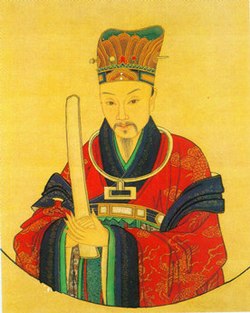Yan Song
This article needs additional citations for verification. (June 2013) |
Yan Song | |||||||
|---|---|---|---|---|---|---|---|
| 嚴嵩 | |||||||
 | |||||||
| Senior Grand Secretary | |||||||
| In office 1544–1545 | |||||||
| Monarch | Jiajing | ||||||
| Preceded by | Zhai Luan | ||||||
| Succeeded by | Xia Yan | ||||||
| In office 1548–1562 | |||||||
| Monarch | Jiajing | ||||||
| Preceded by | Xia Yan | ||||||
| Succeeded by | Xu Jie | ||||||
| Grand Secretary | |||||||
| In office 1542–1562 | |||||||
| Monarch | Jiajing | ||||||
| Minister of Rites | |||||||
| In office 1536–1543 | |||||||
| Monarch | Jiajing | ||||||
| Preceded by | Xia Yan | ||||||
| Succeeded by | Zhang Bi | ||||||
| Personal details | |||||||
| Born | 3 March 1480 Fenyi County, Jiangxi | ||||||
| Died | 29 May 1567 (aged 87) | ||||||
| Education | jinshi degree (1505) | ||||||
| Courtesy name | Weizhong[a] | ||||||
| Art name | Jiexi[b] | ||||||
| Chinese name | |||||||
| Traditional Chinese | 嚴嵩 | ||||||
| Simplified Chinese | 严嵩 | ||||||
| |||||||
Yan Song (3 March 1480 – 1567), courtesy name Weizhong, art name Jiexi, was a Chinese scholar-official during the Ming dynasty. He held various high-ranking positions during the reign of the Jiajing Emperor in the mid-16th century, including minister of rites (1536–1543), grand secretary (1542–1562), and head of the Grand Secretariat (1544–1545, 1548–1562).
He came from a merchant family in Jiangxi Province. His father was a teacher and principal at a local school. After passing the civil service examinations, he excelled in the final round, the palace examination, in 1505, ranking fifth among all candidates. This was a remarkable achievement. As a distinguished graduate of the examinations, he was appointed to the Hanlin Academy, where he eventually rose to the position of Hanlin academician and head of the academy in Nanjing. From 1525 to 1528, he served as the chancellor of the Imperial University, and later held the positions of vice minister of rites (1528–1531) in Beijing and minister of rites (1531–1536) in Nanjing. In 1536, he returned to Beijing to assume the high-ranking roles of minister of rites and grand secretary. In his role as minister of rites, he oversaw important tasks such as rituals and ceremonies, foreign relations, state Confucian schools, civil service examinations, and the affairs of the imperial family. As a minister and one of the grand secretaries, he was one of the closest advisors to the emperor, and in the 1550s, he was the emperor's most trusted confidant. As a statesman, he was diligent and responsible, while also maintaining a polite and modest demeanor. In his political dealings, he often sought compromise solutions.
As a prominent statesman, he was frequently sought after for support and often delegated the task of dealing with applicants to his son, Yan Shifan. Their political rivals repeatedly accused Yan Shifan of engaging in corrupt practices and using bribery to influence politics. Despite defending himself against these accusations for a considerable amount of time, he was ultimately removed from his position in 1562 due to his advanced age. As a result, his son was also exiled. In 1564–1565, Yan Shifan was accused of plotting a rebellion and was subsequently executed. The family's immense wealth, accumulated during Yan Song's time in high office, was seized by the authorities, leaving Yan Song to live out his final days in poverty and isolation.
Biography
[edit]Early life
[edit]Yan Song was born in Fenyi, modern-day Jiangxi province, with ancestral roots in Shaowu. His father, a scholar who had repeatedly failed the imperial examination, while put great effort into educating his son from childhood. A talented scholar, he passed the village examinations at the age of 10, and acquired the jinshi degree at the age of 25, being inducted into the imperial secretariat (Hanlin Academy) as an editor.
His early career was quickly cut short by a severe illness which forced Yan Song to return to his hometown, though this proved to be a blessing in disguise, since it kept him away from the imperial court just as it was under the domination of powerful eunuch Liu Jin.
Yan Song returned to Beijing not long after the fall of Liu Jin, returning to work in the Hanlin Academy in both Beijing and auxiliary capital Nanjing.
Senior Grand Secretary
[edit]Yan Song was the Senior Grand Secretary under the Jiajing Emperor from 1544 to 1545 and from 1548 to 1562. Yan was a close ally of Zhao Wenhua.[1] During his second term as Senior Grand Secretary, he and his son Yan Shifan dominated court politics with the tacit consent of the fatuous monarch who shirked his responsibilities as emperor and devoted much of his time to sensual pleasures and Taoist practices. Yan Song's wealth is said to have been so great as to have been comparable to that of the emperor. He is also well known for his corruption and had been known to openly sell government positions for cash during the Jiajing Emperor's reign, but his corruption and treachery created many political opponents. In order to suppress dissent, he had prominent critics such as Yang Jisheng imprisoned and executed. Yan Song was finally disgraced in his later years and died in poverty not long after that, while his son, Yan Shifan, was executed for collaborating with the wokou pirates who invaded Chinese coastal provinces at the time.
He was the subject of the Chinese opera called Beating Yan Song (打嚴嵩 Dǎ Yán Sōng).
See also
[edit]Notes
[edit]References
[edit]- ^ Nicola Di Cosmo (2009). Military culture in imperial China. Harvard University Press. p. 322. ISBN 978-0-674-03109-8. Retrieved 28 May 2013.
